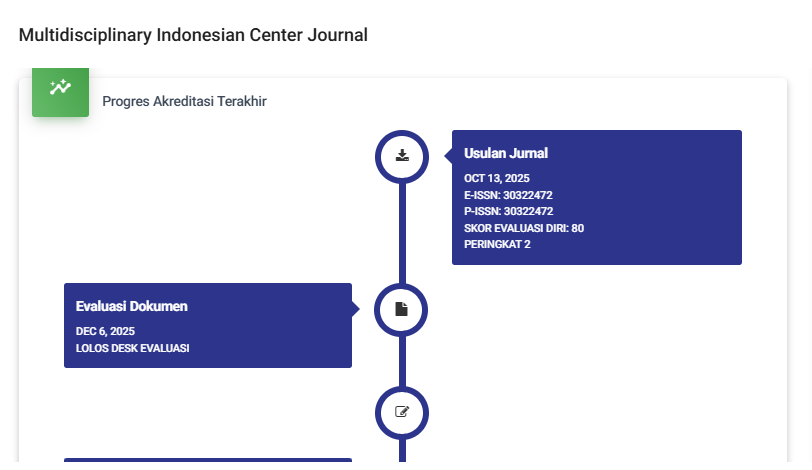VALUE-BASED REPUTATION: TRANSFORMING ISLAMIC BANKING GOVERNANCE IN REALIZING THE SUSTAINABLE DEVELOPMENT GOALS (SDGs)
DOI:
https://doi.org/10.62567/micjo.v2i4.1547Keywords:
value-based governance, Islamic banking, Sustainable Development Goals (SDGs)Abstract
This study aims to construct a conceptual model integrating value-based governance, value-based reputation, and the Sustainable Development Goals (SDGs) within the context of global Islamic banking. The research is motivated by the need to bridge Islamic ethical values with modern governance and sustainability paradigms that emphasize the balance between profitability, moral integrity, and social responsibility. Employing a systematic literature review and thematic synthesis through qualitative analysis, this study identifies, categorizes, and synthesizes key conceptual themes relevant to the research focus. The findings reveal that value-based governance serves as an ethical foundation that strengthens value-based reputation, while the latter functions as a catalyst for achieving sustainable development objectives. The synergy among these three elements produces a governance model that positions the principles of maqāṣid al-sharī‘ah as a normative framework for ethical, transparent, and sustainable Islamic financial practices. The primary contribution of this research lies in the simultaneous integration of the three major frameworks—value-based governance, value-based reputation, and SDGs—which enriches theoretical discourse on Islamic financial governance and provides strategic direction for the development of policy, sharia auditing, and sustainability reporting systems oriented toward ethical values and global welfare.
Downloads
References
Azwar, A., & Usman, A. H. (2025). Aligning Indonesia’s economic goals with SDGS: Strengthening Qur’anic principles in Islamic finance. Jurnal Ekonomi & Keuangan Islam, 11(1), 80-99. https://doi.org/10.20885/JEKI.vol11.iss1.art6 Jurnal Universitas Islam Indonesia+1
Ibnu, A. R., & (2024). Integrating Maqaṣid al-Shariah into the Sustainable Development Goals: A comparative analysis from an Islamic economic perspective. JEKSYAH: Islamic Economics Journal, 5(02), 116-128. https://doi.org/10.54045/jeksyah.v5i02.2837 ejournal.iaingorontalo.ac.id
Baiq El badriaty, 2018). Mplikasi Nilai-Nilai Etika Pada Bisnis Perspektif Al-Qur’an Dan Al-Hadit. Jurnal Kajian Ekonomi dan Perbankan. https://ejournal.unuja.ac.id/index.php/profit
Basalma, E. O. (2024). The SDG-Islamic Banking Nexus. SHARE: Sustainable Research in Islamic Finance and Economics, 13(1), 351-372. https://jurnal.ar-raniry.ac.id/index.php/Share/article/download/21917/pdf/68882
Bhandari, P. (2020, January 14). What is qualitative research? Methods & examples. Scribbr Blog. https://www.scribbr.com/methodology/qualitative-research/
“Criteria for Good Qualitative Research: A Comprehensive Review.” (2021). Asia-Pacific Education Researcher, 31, 679-689. https://doi.org/10.1007/s40299-021-00619-0
Candera, M. (2025). Corporate Governance and Sustainability in Islamic Banking. Milkiyah: Journal of Islamic Banking, 5(2). https://jurnal.stainmajene.ac.id/index.php/milkiyah/article/download/1468/751
Dewi, A. K. (2025). Sustainable Finance in Islamic Banking. Jurnal IBIK, 10(1). https://jurnal.ibik.ac.id/index.php/jimkes/article/download/3489/2586
Ismail, A. Y., Musafar Hameed, L. B., Mohamad Suhaimi, A. F., Jamaludin, N. I., & Shahimi, S. (2020). Value-based intermediation and interconnection of Sustainable Development Goals in Islamic banking framework. International Journal of Islamic Economics and Finance Research, 3(1), 45-56. https://doi.org/10.53840/ijiefer11 ijiefer.uis.edu.my
Jan, A., Mata, M. N., Albinsson, P. A., Martins, J. M., Hassan, R. B., & Mata, P. N. (2021). Alignment of Islamic Banking Sustainability Indicators with SDGs: Policy Recommendations for Addressing the COVID-19 Pandemic. Sustainability, 13(5), 2607. https://doi.org/10.3390/su13052607
Jumiati, E. (2024). The role of Islamic economics in achieving Sustainable Development Goals (SDGs): A bibliometric perspective. Al-Falah: Journal of Islamic Economics, 9(2). https://doi.org/10.29240/alfalah.v9i2.11831 Rumah Jurnal IAIN Curup
Lestari, I. P., Hanafi, M. M., & Wardhana, L. I. (2025). A Literature Review of Updated Islamic Corporate Governance Elements: Implications for Indonesia. Journal of Islamic Monetary Economics and Finance, 11(1), 91-118. https://doi.org/10.21098/jimf.v11i1.2305
Mas’ud, R. (2021). Strategi Membangun Citra Perbankan Syariah. Mataram: Sanabil. ISBN 978-623-317-308-7
Mohajan, H. K. (2018). Understanding qualitative research methodology: A systematic review. ResearchGate. https://www.researchgate.net/publication/389870569_Understanding_Qualitative_Research_Methodology_A_Systematic_Review
Muhmad, S. N., Arif, A. M., Majid, N. A., & Abidin, A. F. Z. (2021). Board of Directors, Shariah Committees and Sustainability Commitment of Islamic Banks in Malaysia. Management and Accounting Review, 20(3), 49-79.
Mukhibad, H., & Setiawan, D. (2022). Sharia Supervisory Board, Maqasid Syariah, and Accounting-Based Performance: Evidence from Indonesia. International Journal of Monetary Economics and Finance, 15(3), 213-231.
Nurcahyo, S. A., Ferdianto, R., Arismaya, A. D., & Anis, M. (2025). Toward sustainable Islamic banking: The role of fintech, knowledge management, green banking, and Sharia compliance. Economica: Jurnal Ekonomi Islam, 16(1). https://doi.org/10.21580/economica.2025.16.1.23752 journal.walisongo.ac.id
Puspitasari, N. D., & Kasri, R. A. (2023). Shariah board governance and sustainability performance: Analysis of Şharia banking in Indonesia. Jurnal Ekonomi & Studi Pembangunan, 24(2). https://doi.org/10.18196/jesp.v24i2.20133 Jurnal UMY
Qualitative Research in Healthcare: Necessity and Characteristics.” (2023). Frontiers in Medicine. PMC 9925284. https://pmc.ncbi.nlm.nih.gov/articles/PMC9925284/
Rahdian, A., Mardian, S., & Razikun, M. (2023). The measurement of Good Corporate Governance in Islamic banking and its effect on financial performance (empirical study of Islamic commercial banks in Indonesia). Jurnal Akuntansi dan Keuangan Islam, 11(2). https://doi.org/10.35836/jakis.v11i2.530 journal.sebi.ac.id
Researching with Qualitative Methodologies in the Time of …” (2023). Qualitative Research Journal. PMC 9816627. https://pmc.ncbi.nlm.nih.gov/articles/PMC9816627/
“The PRISMA 2020 statement: an updated guideline for reporting …” (2021). Systematic Reviews, 10, 89. https://doi.org/10.1186/s13643-021-01626-4
Sari, Y. S., Fitri, S. R., & Pertiwi, H. (2024). Implementation of ESG (Environmental, Social, Governance) in Islamic banks: A critical and strategic review. Al-Muwazanah: Indonesian Journal of Islamic Economics. https://doi.org/10.?? (lihat versi pra-cetakan) Jurnal ZMS Adra
Sutton, J., & Austin, Z. (2015). Qualitative research: Data collection, analysis, and management.” Canadian Journal of Hospital Pharmacy, 68(3). PMC 4485510. https://pmc.ncbi.nlm.nih.gov/articles/PMC4485510/
The critical interpretive synthesis: an assessment of reporting practices.” (2020). Research Synthesis Methods. https://doi.org/10.1080/13645579.2020.1799637
Tracy, S. J. (2010). Qualitative quality: Eight “big-tent” criteria for excellent qualitative research. Qualitative Inquiry, 16(10), 837-851. (cited in criteria reviews)
“Purposeful sampling and saturation in qualitative research.” (2025). Journal of Business Research. https://doi.org/10.1007/s11846-025-00881-2
Walad, M. M., Anggraini, T., & Yanti, N. S. (2023). The influence of Islamic Corporate Social Responsibility and Islamicity Performance Index disclosure on company reputation: An empirical study of Sharia banks in Indonesia. International Journal of Economics, Business and Accounting Research (IJEBAR), 7(3). https://doi.org/10.29040/ijebar.v7i3.10933 Jurnal STIE AAS
Widodo, E. W. (2024). The influence of directors’ characteristics on the social performance of Sharia banking in Indonesia. European Journal of Business and Management Research, 9(4). https://doi.org/10.24018/ejbmr.2024.9.4.2309
Downloads
Published
How to Cite
Issue
Section
License
Copyright (c) 2025 Abdul Hafith, Baiq El Badriati, Riduan Mas’ud

This work is licensed under a Creative Commons Attribution-ShareAlike 4.0 International License.



























